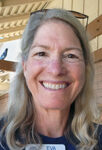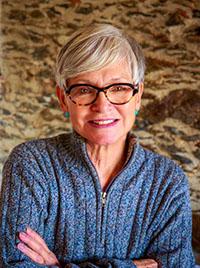By Eva Trieger

RAMONA, California — Thanks to the website, My Jewish Learning, I got a first-class ticket to Italy. Well, okay, so it wasn’t an all-expenses paid visit to the entire country, and I didn’t get to sample gelato, but I did learn a great deal about the Jews of Calabria and their descendants, many who are oblivious about their Judaism.

Rabbi Barbara Aiello, the first female rabbi in Italy, hosted this tour of our European forebears in this Zoom program, sharing historic and personal family facts. Though born in Pittsburgh, Rabbi Aiello’s family hailed from Serrastretta, a village in Calabria. The rabbi stated that Calabria is roughly the size of the state of Virginia and at one time boasted a population that was 50% Jewish.
In order to learn about these Jews who lived in the “instep and toe” of the boot, Rabbi Barbara had to become an “investigatore” and return to the era of the Maccabees, when she told us that Jews, of their own volition sailed to Italy in search of mercenary soldiers. This was the first diaspora.
Centuries later, with the arrival of the Inquisition, Jews were pushed out of Spain. They had two options, convert to Christianity or leave the country. These Jews, fleeing persecution, found safe haven in Italy. The name given to this group is the Anusim, the “forced ones.” The group of people who opted to convert were called Marranos, an insulting name meaning pigs. Many Jews chose to appear to assimilate on the surface, but took their Judaism underground. These secret Jews bore the title Crypto Jews.
The Crypto Jews struggled to come up with clever ways to keep Jewish traditions alive while avoiding detection. In Nicastro, the thriving heart of Jewish life, King Frederick II was a benevolent ruler and the Jews thrived. The 1200s were a calm and prosperous time for Italy’s Jews.
Sadly, in 1492 the Inquisition reached from Spain to Portugal to Sicily and eventually to the mainland and found the synagogue of Timpone. This once thriving structure was usurped and reconstructed as a Catholic church. Rabbi Aiello informs us that it was a common practice for the invaders to keep a Jewish remnant, whether out of fear or guilt. As evidence, the Magen David remains present in the architecture of the remodeled church.
When the Inquisitors took Timpone, the region’s Jewish women were forced to wear head covering and shawls of blue. This was intended to humiliate and denigrate them as it was also the color of coverings worn by prostitutes. The Jewish men of Calabria were forced to wear an orange patch, identifying them.
The authorities passed laws that forbade Jews from their practice of money lending, though they were known and respected for their honesty and diligence. These jobs were given to non-Jews who loaned money at three times the rate of interest. Following 1623, there was a devastating earthquake, and the Jews of Timpone were forced out. Even their Christian neighbors cried as they saw the Jews forced to leave and seek safety in the mountains.
This banishment led Rabbi Aiello’s ancestors to create a home where they could live unmolested and practice their beliefs. That town was Serrastretta. Here in a church, the Jews could set up their hidden community. The panels of this church door reveal the crafts of the Jews, chair making, cloth weaving, and dancing. Even the ceiling of the church holds a surprise. Where one might expect to see Mary and Baby Jesus or images of the crucifixion, there is a painting of Moses and the Ten Commandments! In this way, Jewish traditions were preserved.
The “rabbina” related that in the 18 years she has lived in this village, it is a regular occurrence that someone comes to her and asks her to look at remnants of Jewish life discovered while remodeling, or putting in a new floor, tiling or removing astroturf. Hidden beneath the surface are stars of David.
The relentless Inquisition caught up to Serrastretta, and destroyed all but two walls of the ancient Jewish synagogue. In 1908 the town was beset by another earthquake, but today, there is an interfaith restoration project underway to commemorate the Jews of the region.
One particularly fascinating segment of Rabbi Aiello’s research involves the origin of surnames. So many Italian names have Jewish meanings, links or describe Jewish occupations. Her website has a section devoted to this study. For just a small sampling, Bonanno means good year, Shana Tova. Ferrari was the name given to the Jewish craftsmen who were skilled wrought iron workers from Spain. The names were useful in making shidduchim, and served as a sort of “Jewish Geography.” Other Jews took on names to sound like devout Catholics, to maintain their “hiding in plain sight.” Examples of this include Aiutamicristo, or Help Me Christ, Gentile, or DeSantis.
So many Jewish practices were modified so that they would not arouse suspicion, yet allowed these observant Jews to maintain their faith. In some mountain communities, rather than blowing shofar in the fall, Jews would blow the ibex horn on December 31st at midnight. One particularly fascinating practice I learned about was regarding Pesach. Since the Inquisition authorities were keenly aware of the seders, benevolent Christian neighbors would provide a room in their home for the fifth night of the chag for Jews to make a seder! Crypto Jews could observe the commandment of the “Passover Pascua.”
Other workarounds employed by these clever, secretive Jews enabled them to continue to keep the mitzvot by offering rationalizations to their non-Jewish neighbors. For example, if a blood spot was found in a raw egg, it was considered unhealthy. Milk and meat were not consumed together because it was bad for digestion. Sweeping was done towards the center of a room so as not to offend the mezuzah at the doorposts.
The program sponsored by My Jewish Learning and hosted by Rabbi Aiello offers wonderful insight into how, though Jews are but a small minority of the world’s population, we have continued to thrive and maintain our faith and culture for millenia. For more information about the Jews of Calabria please visit https://rabbibarbara.com
*
Eva Trieger is a freelance writer specializing in coverage of the arts
So interesting. Glad you were able to travel to Italy….and take us with you.